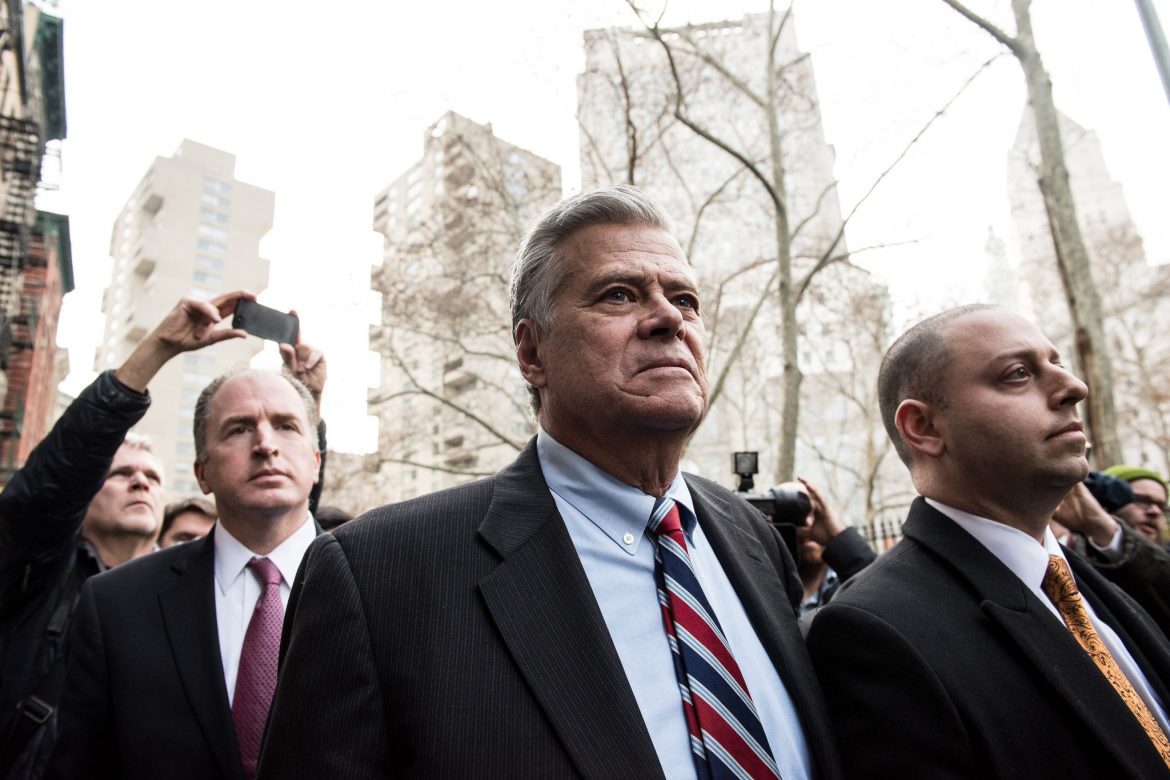This material belongs to: The New York Times.
A federal appeals panel on Tuesday overturned the 2015 corruption convictions of Dean G. Skelos, once the powerful majority leader of the New York State Senate, and his son, Adam B. Skelos, toppling the final bookend of what had been historic, back-to-back convictions of two of Albany’s most entrenched leaders.
In ruling in favor of the Skeloses, the judges — just as another appellate panel did in July for Sheldon Silver, the former longtime Democratic speaker of the State Assembly — cited a decision last year of the United States Supreme Court that narrowed the legal definition of corruption in a case that involved Bob McDonnell, the former Republican governor of Virginia.
The convictions of Mr. Skelos and Mr. Silver had heralded a deathblow to the culture of corruption in Albany, sending a signal that no politician in New York was immune from the scrutiny of Preet Bharara, then the United States attorney in Manhattan.
But in the McDonnell opinion, the Supreme Court made it harder for prosecutors to prove corruption. The court ruled that only formal and concrete government actions or decisions could serve as a basis of a corruption prosecution, and not political courtesies like setting up a meeting.
The McDonnell ruling has had a broad ripple effect, with defense lawyers raising it in other corruption cases.
In the Skeloses’ case, the panel found that the judge’s explanation to the jury of an official action was too broad, and that the jury may have convicted the Skeloses for conduct that, under the McDonnell ruling, was not unlawful.
“Because we cannot conclude that the instructional error as to ‘official acts’ was harmless beyond a reasonable doubt,” the panel said, “we are obliged to vacate defendants’ convictions in their entirety and to remand the case for a new trial.”
The ruling capped a remarkable recent turn of fortune in New York’s power circles: Mr. Bharara was fired by the Trump administration in March; Mr. Silver’s conviction was overturned this summer; and now the Skelos verdicts have been set aside.
But the appellate panel on Tuesday made it clear that the government’s evidence was still sufficient to allow a properly instructed jury to convict the Skeloses, finding that there was enough evidence to establish that there had been a quid pro quo arrangement in each of the schemes at issue.
Federal prosecutors said they intended to move quickly to retry Mr. Skelos and his son, just as they have done with Mr. Silver, who is currently scheduled to be retried in April. Mr. Skelos and Mr. Silver both forfeited their seats upon their convictions.
“We look forward to a prompt retrial where we will have another opportunity to present the overwhelming evidence of Dean Skelos and Adam Skelos’s guilt and again give the public the justice it deserves,” Joon H. Kim, the acting United States attorney in Manhattan, said.
Mr. Bharara said on Twitter on Tuesday that the ruling was not unexpected but was still disappointing. The Supreme Court “made it harder to punish corruption, but justice should prevail here,” Mr. Bharara wrote.
As with Sheldon Silver, SDNY will retry Dean and Adam Skelos. SCOTUS made it harder to punish corruption, but justice should prevail here. https://t.co/MxstvJLTdJ
— Preet Bharara (@PreetBharara) 26 сентября 2017 г.
Mr. Skelos, a Long Island Republican, and his son were convicted in December 2015 of bribery, extortion and conspiracy. Prosecutors had accused the men of abusing the father’s office to pressure a Manhattan developer, a medical malpractice insurer and an environmental technology company to provide the son with hundreds of thousands of dollars in consulting work, a no-show job and a direct payment of $20,000.
The evidence at the four-week trial offered a raw, unvarnished look at dysfunction and nepotism in Albany. All three companies — Glenwood Management, Physicians’ Reciprocal Insurers and AbTech Industries — had relied on Senator Skelos for legislation that was critical to their businesses, prosecutors had said.
Prosecutors had argued that AbTech hired Adam Skelos after his father repeatedly pressured Glenwood to find him employment, and that AbTech needed his father on its side to win a $12 million storm water treatment contract in Nassau County, on Long Island. The panel cited a so-called “hostage email” sent to AbTech, warning that unless it paid Adam Skelos more, his father might withdraw his support for the contract.
The Skeloses’ lawyers had argued in their appeal that the evidence was insufficient to support the convictions, but the panel rejected that position.
“The abundant record evidence that Dean Skelos traded his vote for legislation beneficial to P.R.I. and Glenwood in exchange for benefits to his son,” the panel said, “is sufficient to allow a reasonable jury to infer the existence of a quid pro quo arrangement” with regard to two of the schemes.
Alexandra A. E. Shapiro, Mr. Skelos’s lawyer, said her client was grateful for the ruling and looked forward to the next steps in the case.
“We believe that as events unfold, it is going to become clear that this is a case that never should have been brought,” she said.
Adam Skelos’s lawyer, Robert A. Culp, said that he and his client were “very gratified” by the ruling.
The trial judge, Kimba M. Wood of Federal District Court in Manhattan, had allowed the Skeloses to remain free on bail pending their appeals. Judge Wood had sentenced Dean Skelos to five years in prison and given Adam Skelos six and a half years.
The appeals panel included Judges Ralph K. Winter, Reena Raggi and Alvin K. Hellerstein.


